SYDNEY, N.S. — The votes are in. And now it’s time to take a closer look at the changing landscape of federal politics in Canada.
Preliminary results show the Liberals winning the bulk of Atlantic Canadian seats.
But some ridings returned to traditional voting patterns with the Conservatives seemingly winning back five seats in Nova Scotia and New Brunswick.
In Cape Breton, red banners remain despite two new faces to appear this fall on Parliament Hill in Ottawa.
As part of the SaltWire Network’s election coverage, we asked regional experts to provide some insights on the country’s 43rd federal election.
Tom Urbaniak

Background: Cape Breton University political scientist with expertise in Canadian politics and public policy.
Your take on the election: “In a minority situation it will be very interesting to see what comes next … in the event of discussions between the Liberals and the NDP. I’m going to be looking to hear what the NDP demand. Will that be electoral reform? Will they insist on a much quicker timeline on Pharmacare? Those would be two critical asks for the NDP in a minority situation propping up the Liberals. A situation of the NDP holding the balance of power in a minority would be a check and balance on the Liberal platforms, especially the progressive elements of the Liberal platform.”
What lies ahead: “We could have a very interesting policy season in front of us because in a minority situation all eyes are on Parliament and the negotiations that have to happen for a government to survive.”
What are your thought on the results in Cape Breton’s two ridings?
Sydney Victoria:
“The NDP and the independent Archie can be very happy with their results in this election, they exceeded expectations. I think part of what happened is when a certain chunk of voters became disillusioned with Jaime Battiste after the revelations of multiple offensive postings over a few years they looked to park their votes somewhere else and that vote did not necessarily go to the Conservative candidate Eddie Orrell in part because there is still a hangover from the Stephen Harper years in Cape Breton, think about the closure of the Veterans Affairs office, concerns about lack of infrastructure funding (etc.)”
The loss by two familiar Conservative politicians:
“Alfie MacLeod and Eddie Orrell are recognized politicians but remember they are running in vast and diverse constituencies, so their personal connection to the voters is not uniform across the constituencies and Alfie MacLeod and Eddie Orrell had to introduce themselves for the first time to many voters so that has to be taken into account here as well also, Andrew Scheer is no help to Eddie Orrell and Alfie MacLeod. They were not putting him front and centre in their local campaigns, they were putting themselves front and centre in their local campaigns because Andrew Scheer not established a warm connection at this point with the voters of Cape Breton.”
Leigh Potvin

Background: Cape Breton University assistant professor of Community Studies with an expertise in political science and sociocultural and political contexts of education. She is also a longtime NDP supporter.
Take on the election: “The Liberals ran a campaign that is the type of campaign that an incumbent government runs when they’re going to win again. And what I mean by that is that it was boring, and they didn’t say much that was interesting because they had a majority and they just had to hang onto it. They had to maintain the status quo and I think they tried to do that.”
What did you think was the top election issue? “I think that there was lots of sort of talk of varying degrees about the environment, but I think the thing that really was happening was there was certainly some mudslinging going on between the Liberals and the Conservatives and people were reacting strongly to that … I think that stuff actually distracted from real issues.”
What do you feel was overlooked this election? “I definitely think there was not enough attention paid to reconciliation with Indigenous people, there wasn’t enough conversation about a formal plan to address or continue to address murdered and missing Indigenous women, I think that was stuff they were not talking about enough.”
Lee-Anne Broadhead

Background: Cape Breton University professor of political science who teaches courses in international relations, environmental politics and political theory.
Your take on the election: My own interest is in global affairs and, as a result, what I look for in any election campaign is a discussion of Canada’s role in the world. One useful framing device is to consider the government’s effort to gain a seat on the UN Security Council. The country’s campaign failed in 2010 and it has now been more than two decades since we last had a seat at the UN’s top table. We are up against Ireland (widely seen as the top candidate) and Norway. The decision will be made in June by a vote in the UN General Assembly.
What a suspected Liberal minority would mean: If there’s a Liberal minority which is what I think is most likely to happen … and the NDP and Green have the power to kind of push the Liberal government in the direction of the international politics that they hold dear, I think the chances of a security council seat are improved.
What was the top issue this election? “The polls have said healthcare 1) and climate change 2) I think there’s generational differences and this is in some ways anecdotal, but I teach first-year international politics and I have never had a class so engaged in … the election.
"They’re all voting, and their number one issue is climate change.”
What issue do you feel was largely missing from the election?
The voting age needs to change, which also the NDP and the Greens (proposed). There could be pressure for the voting age and I can’t imagine why they weren’t talking about that. That’s a good way to get young people out voting.”
Margaret Brigley

Background: Halifax-based CEO & Partner at Narrative Research (formerly Corporate Research Associates) with more than 25 years progressive market research and communications experience.
Take on the race: “I think that this election was closer perhaps than people thought it would be initially, and there’s no question that it did become very competitive and at times candidates were quite critical of each other. But certainly, it’s been one that has been a very competitive showing…A little dirtier and I think that’s perhaps indicative of close races at times.”
Changing times in Eastern Canada: “Historically it’s been two-horse races in the region, but certainly we saw that within the Maritimes the Green Party really established itself as the third party of choice across the Maritimes early on in the election. It’s just been within the last few weeks where Jagmeet Singh… there’s been another surge of the NDP within the Maritimes. In Newfoundland and Labrador that’s different because the NDP is clearly positioned there as the third party of choice. The Green Party has just not successfully established itself in Newfoundland and Labrador.”
RELATED:
- Battiste, Kelloway continue Liberal rule in Cape Breton
- VIDEO: Cape Breton centenarian born before women’s suffrage says voting is a privilege all citizens should embrace
- Who's on the ballot in your riding in Cape Breton?
- Election Day: Voters head to the polls in Cape Breton
- VIDEO: Voters' Voice: If you were elected MP, what’s the first thing you’d try to change?
- VIDEO: Voters' Voice: What is a big issue for you in this election?
- VIDEO: Voters' Voice in Cape Breton
- ELECTION DAY: A non-partisan guide for the perplexed Canadian voter
- Promises, promises: A checklist for voters


